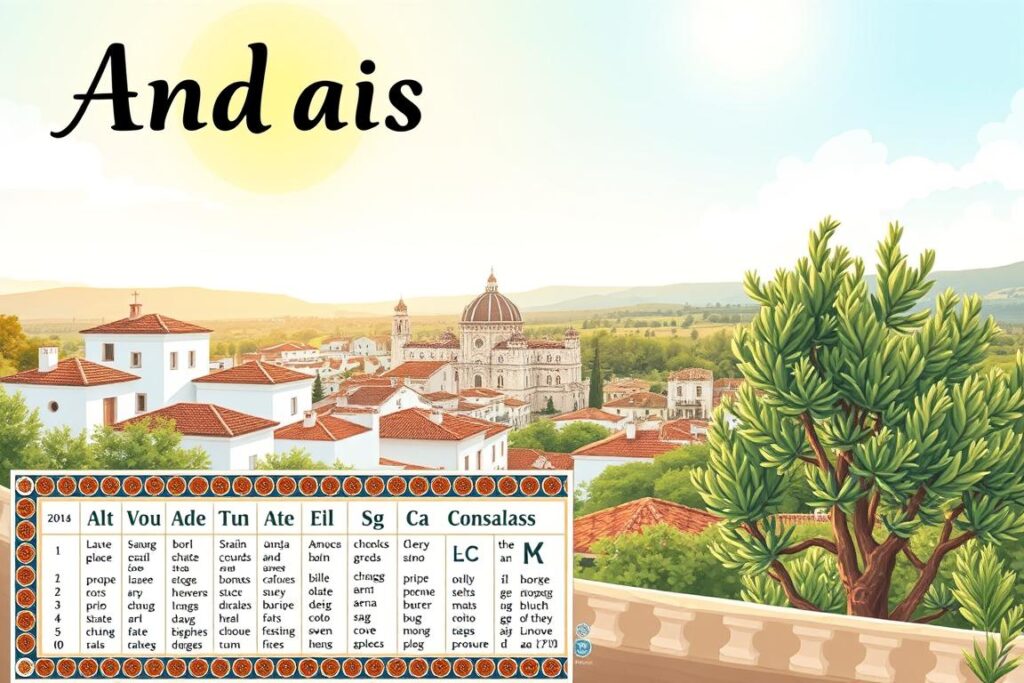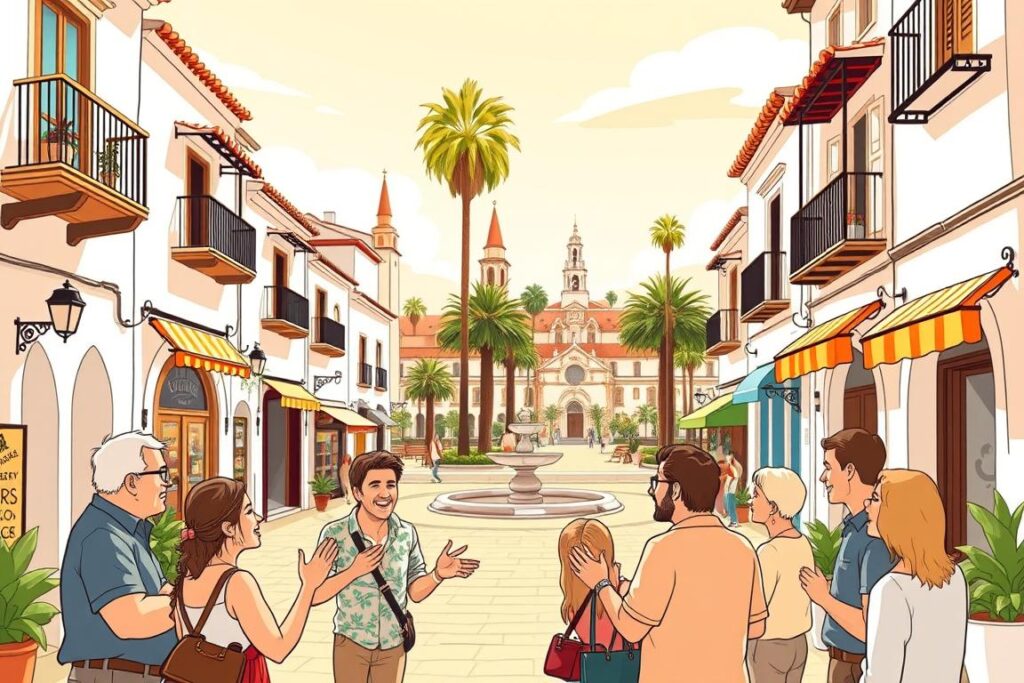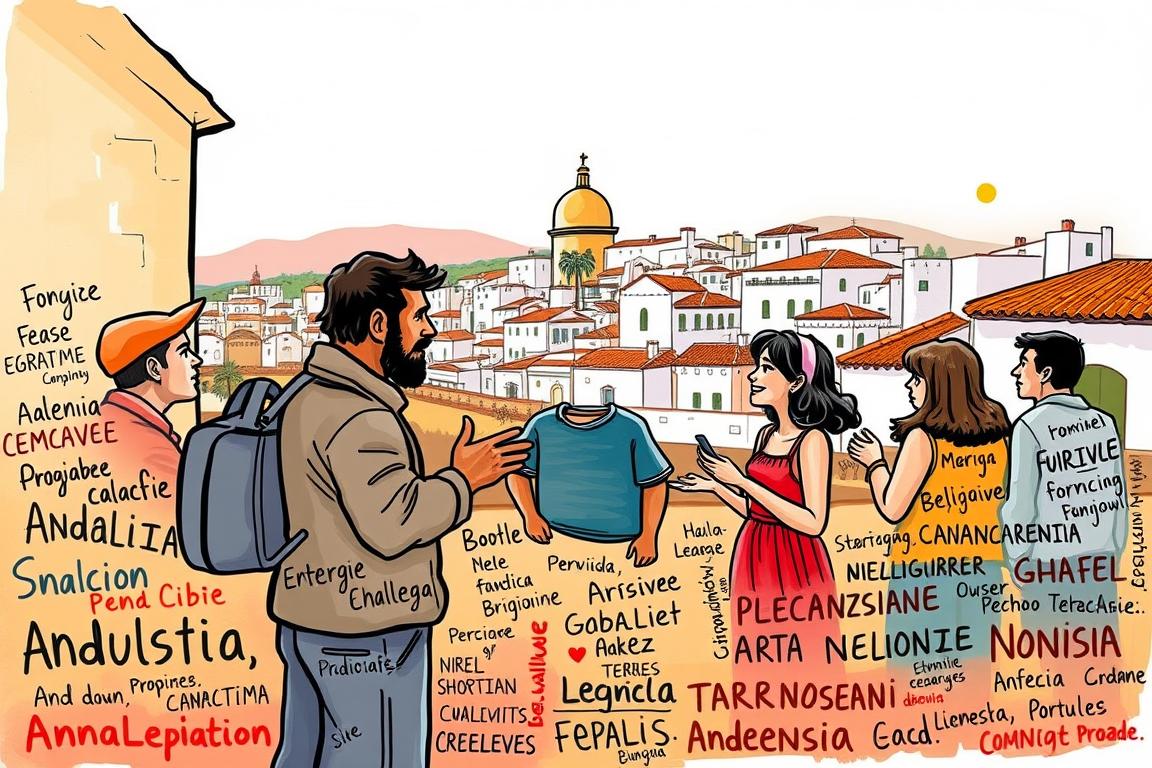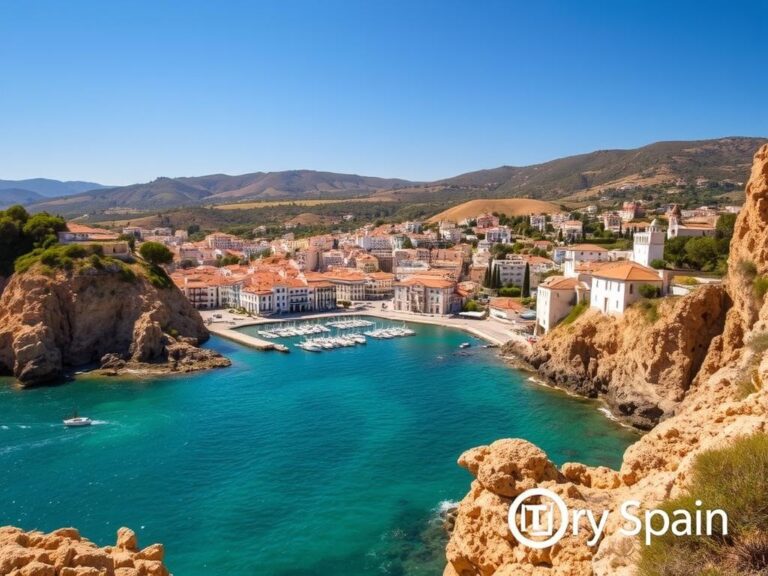Discover Andalusian Spanish: Phrases to Know
Ever wondered what makes southern Spain special? It’s not just the history or landscapes. It’s also the way people talk.
The Andalusian dialect has its own unique flavor. It’s different from standard Spanish. Learning these expressions can make your travels better or help you connect with the local culture.
Learning these expressions can enrich your travel experience or deepen your connection with the local culture. By understanding the nuances of this dialect, you’ll be able to appreciate the region’s identity more fully. In this article, we’ll explore some essential phrases to get you started on your journey to mastering the Andalusian dialect.
Understanding Andalusian Spanish: A Unique Dialect

Andalusian Spanish has deep roots from many cultures. It’s not just a mix of history but also a part of who the Andalusian people are today.
Historical Background of Andalusian Spanish
The history of Andalusian Spanish is rich and varied. The Romans, Visigoths, and Moors all played a role. They brought new words and sounds into the dialect.
The Moorish influence is clear in some words and sounds. This shows how the dialect has grown over time.
Andalusia’s location has also shaped its Spanish. Being a meeting point of Europe and Africa made it a cultural mix. This mix has enriched the dialect.
Key Features That Distinguish Andalusian Spanish
Andalusian Spanish has unique sounds. One key feature is dropping the “s” sound at the end of words. This gives it a special flavor.
Other features like soft consonants and changed vowels also make it stand out. These sounds make Andalusian Spanish easy to recognize.
| Feature | Description | Example |
|---|---|---|
| “S” Dropping | Omission or aspiration of “s” at the end of syllables | “las casas” pronounced as “lah cahah” |
| Consonant Softening | Softening of certain consonants | “todo” pronounced more softly |
| Vowel Modifications | Changes in vowel pronunciation | Varies by region within Andalusia |
Knowing these features helps us see why Andalusian Spanish is special. It’s a big part of Andalusia’s culture and identity.
Pronunciation Guide for Andalusian Spanish

Learning Andalusian Spanish pronunciation is key. It involves understanding sound changes like the “s” dropping. This dialect is both melodic and challenging to master.
The Famous “S” Dropping Phenomenon
Andalusian Spanish is known for dropping the “s” sound at the end of words. For example, “los amigos” sounds like “lo amigo” or “loh amigoh.” This happens a lot in casual speech and changes by region.
Consonant Softening and Aspiration
Andalusian Spanish softens consonants, making them less sharp. Sounds like “s” and sometimes “j” or “g” are aspirated. This gives the dialect a relaxed feel. For instance, “la casa” might sound like “la cahah.”
Vowel Modifications in Andalusian Dialect
Vowels in Andalusian Spanish are pronounced differently than in standard Spanish. This, along with consonant changes, makes the dialect unique and musical.
Let’s look at some examples:
| Phrase | Standard Spanish Pronunciation | Andalusian Spanish Pronunciation |
|---|---|---|
| Los amigos | lohs ah-MEE-gohs | loh ah-MEE-goh |
| La casa | lah KAH-sah | lah KAH-hah |
| Las naranjas | lahs nah-RAHN-hahs | lah nah-RAHN-hah |
Practicing these unique features will help you communicate better in Andalusian Spanish.
Essential Andalusian Spanish Phrases for Everyday Conversations

Learning everyday Andalusian Spanish can really improve your trip to southern Spain. Walking through Seville, Granada, or Málaga, you’ll connect better with locals. Saying hello, being polite, and saying goodbye in their way makes your talks more real and fun.
Greetings and Introductions
Starting a conversation with a greeting is key. In Andalusian Spanish, you might hear “mi arma” (my soul) as a friendly greeting. For formal greetings, use “buenos días” (good morning) and “buenas tardes” (good afternoon). Asking “¿cómo estás?” (how are you?) is a great way to begin a chat.
Common Expressions of Politeness
Being polite is very important in Andalusian culture. You’ll often hear “por favor” (please), “gracias” (thank you), and “disculpa” (excuse me). To be even more polite, say “¿me puedes ayudar?” (can you help me?) instead of directly asking.
Saying Goodbye the Andalusian Way
Andalusians have special ways to say goodbye. You might hear “hasta luego” (see you later), “hasta mañana” (see you tomorrow), or “que te vaya bien” (may things go well for you). Using these phrases can make a good impression on the locals.
Adding these essential Andalusian Spanish phrases to your words will help you talk more confidently and naturally. This will make your time in this stunning part of Spain even better.
Food and Dining Expressions in Andalusian Spanish
To enjoy Andalusian food, you need to know its special words for food and dining. The area’s food culture is rich and varied. It has a unique taste that shows in its language.
Ordering in Restaurants and Tapas Bars
In Andalusia, ordering food is different from regular Spanish. For example, to ask for a beer, say “¡Ponme una caña!” (give me a beer). Tapas are a big part of dining here, so knowing how to order them is key. You might ask “¿Qué tapas recomendáis?” (what tapas do you recommend?) for suggestions.
Some common orders include:
- “Un café, por favor” (a coffee, please)
- “La cuenta, por favor” (the bill, please)
- “¿Qué es eso?” (what is that?) – to ask about a dish
Food-Related Slang and Idioms
Andalusian Spanish has lots of slang and idioms about food. For instance, “darle caña” (to scold someone) means “give him cane,” but it’s used to tell someone off. Knowing these phrases can make talking with locals more fun.
| Expression | Meaning | Example Usage |
|---|---|---|
| Tomar el pelo | To pull someone’s leg | “Me estás tomando el pelo con ese cuento” |
| Estar hecho un brazo de mar | To be very happy or excited | “Estoy hecho un brazo de mar con mi nuevo trabajo” |
Complimenting the Chef in Andalusian Style
It’s important to praise the chef in Andalusia. Saying “¡Qué rico está!” (this is delicious) or “¡Está buenísimo!” (this is very good) shows your appreciation. To praise the chef directly, say “¡Enhorabuena al cocinero!” (congratulations to the chef!).
Using these phrases will make your dining experience better. It also shows respect for the local culture and food.
Navigating Cities with Andalusian Spanish Phrases
Exploring Andalusian cities is easier with the right phrases. You can ask for directions or use public transport. Knowing the local dialect makes your trip better, whether in Seville, Granada, or Málaga.
Asking for Directions in Seville, Granada, and Málaga
Exploring these cities might make you need directions. Here are some key phrases:
- ¿Dónde está…? (Where is…?)
- ¿Cómo se llega a…? (How do you get to…?)
- ¿Está lejos? (Is it far away?)
- La dirección, por favor (The direction, please)
In Seville, you might ask, “¿Dónde está la Catedral de Sevilla?” (Where is the Seville Cathedral?). In Granada, you could say, “¿Cómo se llega a la Alhambra?” (How do you get to the Alhambra?).
Transportation Terminology with an Andalusian Twist
Knowing local transport terms helps you move around better. Some important phrases are:
- Metro (Metro)
- Autobús (Bus)
- Parada de autobús (Bus stop)
- Estación de tren (Train station)
In Málaga, you might use the metro, asking, “¿Dónde está la estación de metro más cercana?” (Where is the nearest metro station?).
Location-Specific Expressions
Andalusia has unique places, each with its own charm. Using location-specific phrases makes your visit more authentic:
- In Seville: “Vamos al barrio de Santa Cruz” (Let’s go to the Santa Cruz neighborhood)
- In Granada: “Quiero visitar el Albaicín” (I want to visit the Albaicín)
- In Málaga: “Me encanta pasear por la Malagueta” (I love strolling along the Malagueta beach)
Using these phrases makes your travels smoother and connects you with the local culture.
Andalusian Spanish Phrases You Need to Know as a Traveler
Andalusian Spanish has its own special flavor. Knowing key phrases can greatly improve your travels. As you wander through Seville, Granada, or Málaga, speaking with locals can make your trip better. Here are some essential phrases to get you started.
Emergency and Health-Related Expressions
It’s important to know how to ask for help or talk about health issues when traveling. Here are some vital expressions:
- ¡Ayuda! – Help!
- ¡Llamen a una ambulancia! – Call an ambulance!
- Estoy enfermo/a – I am sick
- ¿Dónde está el hospital más cercano? – Where is the nearest hospital?
Accommodation and Hotel Vocabulary
Finding and enjoying your accommodation is a key part of traveling. Knowing the right vocabulary can make checking in and out easy.
| English | Andalusian Spanish |
|---|---|
| Hotel | Hotel |
| Room | Habitación |
| Reservation | Reserva |
| Check-in | Check-in or entrada |
| Check-out | Check-out or salida |
Shopping and Bargaining Phrases
Shopping in local markets is a highlight of traveling in Andalusia. Knowing how to bargain and ask for prices is key.
- ¿Cuánto cuesta? – How much does it cost?
- Me gusta, pero es demasiado caro – I like it, but it’s too expensive
- ¿Tiene descuento? – Do you have a discount?
- Me lo llevo – I’ll take it
Mastering these phrases will help you navigate everyday situations. It also shows respect for the local culture, making your travel experience in Andalusia better.
Learn Andalusian Spanish Through Regional Idioms and Sayings
To really get Andalusian Spanish, dive into its colorful idioms and sayings. These phrases add spice to your language. They also give you a peek into the region’s culture and everyday life.
Weather-Related Idioms
Andalusian Spanish is full of weather-related idioms. These reflect the area’s climate and how it affects daily life. For example, “hacer un tiempo de perros” means “to be stormy weather.” But it’s used to describe a chaotic situation. Knowing these idioms helps you talk about the weather and more.
Expressions About Life and Philosophy
Andalusian idioms often talk about life’s big questions and experiences. Phrases like “No tener pelos en la lengua” (to be straightforward) or “Estar en el ajo” (to be in the know) show the direct and social nature of Andalusian culture. Using these phrases makes your language more interesting and relatable.
Andalusian Proverbs and Their Meanings
Andalusian Spanish is full of proverbs that share wisdom and cultural values. For example, “Tomar el pelo” means “to pull someone’s leg,” and “Costar un ojo de la cara” means “to cost an arm and a leg.” These proverbs not only add to your vocabulary but also give you a look into Andalusian thinking.
Some other notable Andalusian proverbs include:
- Dar la lata – to annoy or bother someone
- Tomar las de Villadiego – to take flight or run away
- Estar de buen año – to be in a good mood or having a good year
By using these idioms and sayings, you’ll not only get better at Andalusian Spanish. You’ll also understand the region’s culture more deeply.
Cádiz Spanish Phrases: The Distinctive Gaditano Accent
In Cádiz, you’ll find a special way of speaking that shows the city’s rich history. The Gaditano accent mixes different influences, thanks to Cádiz’s role as a major port. This unique dialect shows the city’s cultural heart.
Unique Vocabulary of Cádiz
Cádiz has its own words that might surprise even native Spanish speakers. For example, locals use “chafardear” to mean gossiping or chatting casually. Knowing these local sayings can make your time in Cádiz more meaningful.
Other unique words include “currar” (to work), “parné” (money), and “chungo” (bad or difficult). Using these words can make your interactions more real and fun.
Carnival Expressions and Terminology
Cádiz’s Carnival is famous, with its own special words and phrases. “chirigota” is a musical group that performs during Carnival, and “comparsa” is a group in the parades. Knowing these terms can help you enjoy the Carnival more.
During Carnival, you might hear “¡Viva Cádiz!” (Long live Cádiz!) or “¡Ole!” (a sign of admiration). Joining in the local celebrations and using these phrases can be unforgettable.
Coastal and Maritime Phrases
Cádiz’s coastal setting means its dialect is full of sea-related words. Phrases like “tomar el viento” (to take the wind) or “navegar por” (to navigate through) are common. Understanding these phrases can give you a glimpse into local culture.
When talking about the sea, locals might say “marejada” (swell) or “calmado” (calm). Using the right words can help you bond with the community and make your visit to Cádiz better.
Andalusian Slang Phrases and Vocabulary Words for Social Settings
Andalusian slang is more than words; it’s a way to connect with the region’s heart and culture. When exploring Andalusia, using the right slang can change how locals see you. It also deepens your cultural experience.
Youth Slang in Urban Andalusia
In cities like Seville and Málaga, youth slang is lively and changing. Terms like Chiquillo/Chiquilla (little boy/girl) and Quillo/Quilla (dude/gal) are popular among the young. Knowing these can help you connect with the youth and understand their culture better.
- Chafardear: to gossip
- Mola: cool, awesome
- Pasta: money
Expressions for Nightlife and Entertainment
Andalusia’s nightlife is famous, and the right phrases can make your night better. At a tablao flamenco or a bar, saying ¡Vámonos! (let’s go!) or ¡Estoy a tope! (I’m having a great time!) can make you feel part of the scene.
Other useful phrases include:
- Tomar el fresco: to go out for a drink
- Ir de tapeo: to go out for tapas
- Salir de marcha: to go out partying
Friendship and Relationship Terminology
Understanding local terms is key to making friends in Andalusia. Words like tronco (mate, buddy) and liga (to hook up with someone) are common. Using them correctly can strengthen your bonds with locals.
Some important terms to know:
- Amiguismo: close friendship
- Parche: a group of friends hanging out together
- Lio: a complicated relationship or situation
Common Mistakes When Speaking Andalusian Spanish
Exploring Andalusian Spanish can be exciting, but it comes with common mistakes. With the right tips, you can avoid these errors. Understanding Andalusian Spanish’s unique traits and challenges is key.
Pronunciation Pitfalls to Avoid
The pronunciation of Andalusian Spanish is quite different. But, it’s also where many learners struggle. For example, mastering the “S” dropping can be tricky. Avoid overdoing it; not every “S” should be dropped, and the context is key.
- Be mindful of when to aspirate or drop consonants.
- Pay attention to vowel modifications that are unique to Andalusian Spanish.
- Practice the softening of certain consonants, like “d” between vowels.
Context-Specific Misunderstandings
It’s important to know when to use certain phrases or words. Some expressions are fine in one situation but not in another. For instance, slang might be okay with friends but not in formal events.
- Learn the appropriate contexts for using slang and idioms.
- Be aware of the regional variations within Andalusian Spanish.
- Practice using formal and informal language correctly.
When Standard Spanish Is Preferred Over Andalusian
Andalusian Spanish is rich and expressive, but standard Spanish is needed in some cases. This includes formal documents, official speeches, and certain professional settings.
Knowing when to switch between Andalusian and standard Spanish is important. It’s not just about being correct; it’s also about being appropriate for the situation.
Resources to Improve Your Andalusian Spanish Skills
Boost your Andalusian Spanish skills with various learning tools and platforms. Whether you’re starting out or already know some Spanish, the right resources can help you get better.
Books and Online Materials
There are many books and online materials to learn Andalusian Spanish. You can find textbooks, language learning apps, and websites focused on Spanish dialects.
- Textbooks: Look for textbooks that focus on regional Spanish dialects, including Andalusian.
- Language Learning Apps: Apps like Duolingo, Babbel, and Rosetta Stone often include Spanish courses that can be adapted for Andalusian Spanish learning.
- Websites: Websites with Spanish language courses or forums discussing regional dialects are great resources.
| Resource Type | Description | Example |
|---|---|---|
| Textbooks | In-depth study materials | “Spanish Regional Dialects” |
| Language Learning Apps | Interactive learning experiences | Duolingo |
| Websites | Online forums and courses | SpanishDict |
Movies and TV Shows with Authentic Andalusian Dialect
Watching movies and TV shows from Andalusia can help you get used to the dialect. Look for films and series from places like Seville, Granada, and Málaga.
- Movies: Find Spanish films set in Andalusia, such as “Volver” or “Ocho apellidos vascos.”
- TV Shows: Spanish TV series with Andalusian characters or settings are very helpful.
Language Exchange Opportunities in Andalusia
Talking with native speakers in Andalusia can really improve your Spanish. Look for language exchange events, conversation clubs, or online platforms to meet native speakers.
- Language Exchange Events: Attend events to practice speaking with locals.
- Conversation Clubs: Join clubs or groups to practice languages, including Andalusian Spanish.
- Online Platforms: Websites and apps for language exchange can connect you with native Andalusian Spanish speakers.
Conclusion: Embracing the Richness of Andalusian Spanish
Exploring Andalusia’s vibrant culture shows that Andalusian Spanish is more than a dialect. It’s a key to understanding the region’s history, traditions, and people. Learning key phrases lets you connect with locals and make your trip better.
This article has given you a peek into Andalusian Spanish’s unique features. You’ve learned about pronunciation and essential phrases for daily talks. You’ve also found out how to get around, order food, and talk with locals in authentic Andalusian Spanish. Embracing Andalusian Spanish improves your language skills and deepens your appreciation for the region’s culture.
As you keep learning Andalusian Spanish phrases, you’ll find it rewarding and enriching. It opens doors to new connections and experiences. So, start embracing the richness of Andalusian Spanish today. You’ll be glad you did.







